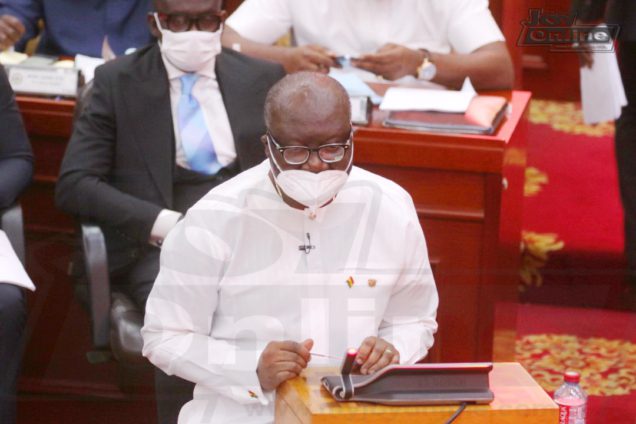Government has set its macroeconomic targets for next year, as it anticipate a growth rate of 5.8% and an inflation rate of 8%.
This is however slightly higher the projections by the International Monetary Fund, the World Bank, Fitch Solutions, amongst other international research institutions.
Also, the government is anticipating a fiscal deficit of 7.4% of Gross Domestic Product and a primary surplus of 0.1% of GDP in 2022.
Total Revenue and Grants is projected at ¢89.1 billion (17.9% of GDP) for 2022 and represents a nominal growth of 23% over the projected outturn for 2021. It is expected to increase to ¢100.6 billion (17.9% of GDP) in 2023, ¢112.5 billion (17.7% of GDP) in 2024 and expected to reach ¢126.3 billion (17.7% of GDP) by 2025.
Total Expenditure (including payments for the clearance of arrears) is projected at ¢128.3 billion (25.8% of GDP) in 2022, ¢135.6 billion (24.1% of GDP) in 2023, and GH¢157.1 billion (22.1% of GDP) in 2025.
Presenting the 2022 Budget Statement and Economic Policy, Finance Minister, Ken Ofori-Atta said the economy is beginning to show signs of recovery from the impact of the COVID-19 pandemic, adding, to sustain this recovery phase, government will continue to support the productive sectors of the economy as well as the vulnerable through the implementation of the Ghana CARES (Obaatanpa) Programme and the flagship intervention programmes.
Medium-term fiscal policy objective is to achieve fiscal consolidation
He mentioned that the broad medium-term fiscal policy objective is to pursue a fiscal consolidation drive towards fiscal and debt sustainability to support macroeconomic stability whilst supporting the implementation of government’s flagship programmes and the Ghana CARES (Obaatanpa) Programme.
The strategy he explained is to progressively reduce the overall fiscal balance back to the Fiscal Responsibility Act (FRA) deficit threshold of 5% of GDP and a primary surplus by 2024.
Objectives of macroeconomic policy
The Finance Minister also said the main thrust of macroeconomic policy in 2022 will focus on ensuring restoration and sustainability of macroeconomic stability with a focus on fiscal and debt sustainability, maintain a good balance between the implementation of the revitalisation and transformation programme through the Ghana CARES (Obataanpa) Programme and fiscal consolidation to promote fiscal sustainability.
The others are to provide supportive private sector environment including promoting entrepreneurship for domestic businesses and for Foreign Direct Investments to thrive, build a robust financial sector to support growth and development; as well as deepen structural reforms to make the machinery of government work more efficiently and effectively to support socio-economic transformation.
Latest Stories
-
Expansion Drive: Takoradi Technical University increases faculties
3 hours -
SHS heads demand payment of outstanding funds before reopening of schools
3 hours -
We thank God for the 2024 general elections – Akufo-Addo
3 hours -
Coconut Grove Beach Resort marks 30 years of excellence with memorable 9 lessons & carols service
4 hours -
WAFU B U-17 Girls’ Cup: Black Maidens beat Nigeria on penalties to win inaugral tournament
4 hours -
Real Madrid beat Sevilla to keep pressure on leaders Atletico
5 hours -
Liverpool put six past Spurs to go four points clear
5 hours -
Manchester United lose 3-0 at home to Bournemouth yet again
5 hours -
CHAN 2024Q: ‘It’s still an open game’ – Didi on Ghana’s draw with Nigeria
6 hours -
CHAN 2024Q: Ghana’s Black Galaxies held by Nigeria in first-leg tie
7 hours -
Dr Nduom hopeful defunct GN bank will be restored under Mahama administration
7 hours -
Bridget Bonnie celebrates NDC Victory, champions hope for women and youth
7 hours -
Shamima Muslim urges youth to lead Ghana’s renewal at 18Plus4NDC anniversary
8 hours -
Akufo-Addo condemns post-election violence, blames NDC
8 hours -
DAMC, Free Food Company, to distribute 10,000 packs of food to street kids
10 hours

